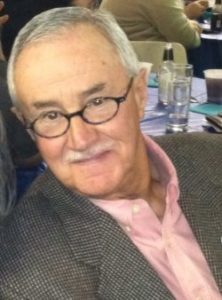by Mike Pyatt

Nineteenth Century French romanticist poet, and novelist, Victor Hugo, who wrote Les Miserables, and The Hunchback of Notre Dame, quoted, “To rove about, musing, that is to say loitering, is, for a philosopher, a good way to spend life.” He confirms that “loitering” isn’t merely a physical act, or the absence of action. It’s a state of mind. The term, primarily pejorative, isn’t common in our vernacular. Yesteryear, it was routine in retail establishments, when a sign was prominently posted, “No loitering!” In some locales such comportment may be prohibited by ordinance, or have the full force of the law with a monetary fine, compulsory free ride to the edge of town, or a complimentary night’s lodging in the local hoosegow.
Webster defines it, “to linger in an aimless way, spending time idly, without purpose.” German philosopher Von Goethe captured its essence, with a warning label, “Lose the day loitering, twill be the same tomorrow, and the rest more dilatory.” A nineteenth century term, albeit not an endearing one, was a “lay about.” Self explanatory. “A loafer, bum, or lazy; reluctant to move.” Today, the objects of such disdain identify themselves as drifters, or “just chillin.”
Years ago, in the pre-CVS/Walgreen era, the local drugstore was a hub for shoppers in our Hoosier neighborhood. Residents frequented it, run by a bespectacled part-time pharmacist, and full-time curmudgeon/grouch. He prided himself in offering an array of sundry items, magazines and comic books, augmented by a full-service soda fountain. He strategically posted a “No Loitering” sign above the magazines, comic books, and emblazoned it on the wall above the soda fountain. That word was foreign to most kids. Parents translated it for us, “Kids don’t read the magazines or comic books; and you’d best buy something when you sit at the soda counter.” It was our first brush with being “undesirables.”
Then, and to a lesser degree contemporarily, anti-loitering’s designed to discourage and reduce the number of “undesirables” and indolent from “just hanging around” places of commerce, protecting private and public interests from beggars, panhandlers or worse. New York City’s former Mayor, Rudy Giuliani dramatically reduced crime, enforcing ordinances already on the books, getting them off of public streets and thoroughfares. Bus stations were a hotbed for loitering. Today, it’s the public library.The lure of the internet. A haven from extreme weather.
Recent High Court rulings on loitering laws and related ordinances have eroded the “city fathers” ability to take direct aim at loitering, by ruling that, for example, both Chicago’s and Orlando’s ordinances were far too vague and granted broad, sweeping latitude for police power abuse. Some believe such laws abridge individual’s constitutional right to assemble. Their co-belligerent, the ACLU, obsequiously agreed to “loiter” with the aggrieved in court. In today’s environment large retailers “welcome lingering,” hoping to convert such behavior into a sale. Shoplifting is still frowned upon, and is met with judicious action, to the extent local ordinances permit. We pay the freight for purloining.
More debilitating and pervasive than physical, momentary or serial loitering, is inward or spiritual loitering. One can be gainfully employed and highly compensated, yet experience a life devoid of purpose or meaning. Just marking time. Loitering doesn’t occur only on a street corner or park bench. How many of us have “loitered in prayer?” Finding ourselves groveling for words, catering to our own interest, or speaking to titillate the ears of the congregates, with our minds fixed on ignoble things, relying on reflex tendencies.
A purposeful life’s based upon the premise that we need to know why we are here on planet earth. Is it just to make a living? Send the offspring to the “best college?” Keeping up with the Joneses? Is there more on this revolving orb? Many of us are sufficiently challenged to persevere in life’s ebb and flow. No easy task escaping the shackles of banality and convention.
Few will have the impact of Steve Jobs or Bill Gates, who contributed in a global fashion that will outlive both. However, one can make a difference on a plane commensurate with one’s own reach. One may confine one’s self to a labor of love requiring a life of relentless research, or an idea that transforms a field of endeavor, such as Curie, Pasteur, Salk, Booker T. Washington, Noah Webster, or Dr. Ben Carson. Make a difference with Special Olympics, investing in those “going for the gold” at a different level than Olympic swimmer, Michael Phelps. Or indefatigable volunteer? Incorruptible public servant? Serve in hospice care? Defend life through True Care Women’s Resource Centers? Extolling liberty? Actively oppose evil? Or as a prayer partner, leaving an indelible mark on a solitary life?
Fewer possess the lofty lyrical talent or prolific pen of a Longfellow, T.S. Eliot or Robert Frost. However, that shouldn’t hinder one’s relentless pursuit of impacting our sphere of influence using our God-given resources. It may demand a conscious, determined resolve to resist the unsubstantial mirage of chasing personal peace and affluence, revealing the enmity between our innate self-serving tendency, and a higher calling. A short poem, attributed to Benjamin Franklin, Mr. Meant-To, says, “Mr. Meant-To has a comrade, And his name is Didn’t Do; Have you ever chanced to meet them? Did they ever call on you.” It ends with, “Don’t be haunted by the ghost of Might-Have-Been.” Opportunities are endless-our earthly pilgrimage isn’t.
What would be more grievous, or inalterable, than to have etched on our headstone, “He(She) Loitered Through Life.” Pretense, pomposity, and inanity, in the final analysis, dupes only the pretender, pompous, and inane. Someone dolefully observed,” One who falls in love with one’s self, never finds one’s equal.” No talent? Giving demands none. Only desire. We’ve heard it said, “For everyone to whom much is given, from him much is required.” What do you think?
Mike Pyatt’s a Natrona County resident. His email’s roderickstj@yahoo.com
